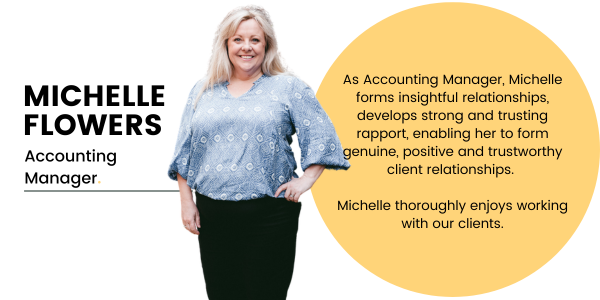Tax Planning for Businesses, Sole Traders + Individuals
Written By: Michelle Flowers | Accounting Team
Staying ahead of tax obligations and changes can be a challenge. At this time of year, we draw attention to the importance of carefully considering any tax planning strategies before the 30 June 2024, ensuring enough time remains to implement any relevant strategies.
Our accounting team at Canny Group are here and ready to help navigate these complexities with you, providing you with confidence that your tax is being well considered and the recommended tax planning strategies are the most relevant and effective for you, your family and/or your business entities.
We emphasize Canny Group’s professional tax planning focuses on ethically minimising overall tax obligations and does not involve tax avoidance. The amount of tax savings achievable is contingent upon your individual circumstances, and there is no one-size-fits-all strategy.
General Tax Planning Considerations: Businesses + Sole Traders
When reviewing your business for tax planning purposes, the accounting team take into consideration several elements. Some of which include the following ideas/topics:
- Subject to cash flow requirements, consider deferring income until after the 30th June 2024, particularly if you anticipate a lower income for the 2024/2025 year compared to 2023/2024;
- It may be more relevant and therefore tax effective, for some small businesses to only be taxed when income is received, rather than invoiced. This would result in the accountant advising to report on a cash basis, rather than accruals;
- A debt can be classified as a bad debt for tax purposes if it’s 12 months overdue and is to be considered unlikely to be recovered. Writing off these bad debts will reduce income, resulting in a decrease in tax payable;
- Ensure superannuation contributions are paid, and received by, the Superannuation Fund before the 30th June 2024. These contributions must be within the relevant contributions caps ($27,5000 for 2023/2024). Note: It is important to note that Superannuation funds can take two weeks to process these to ensure enough time has been left for the payment to be processed. If not processed in time, the amount is unable to be deducted until the following year;
- The timing of businesses purchasing major equipment or replacement of capital equipment can impact in substantial tax savings. The timing of these will be discussed and confirmed;
- The small business instant asset write-off threshold will temporarily increase to $20,000 from 1st July 2023 until 30th June 2024. Small businesses with aggregate turnover of less than $10m, will be able to immediately deduct the full cost of eligible assets costing less than $20,000 per asset, that are first used or installed ready for use between the 1st July 2023 and 30th June 2024;
- Depreciation can only be claimed for assets first used, or installed ready for use, before the 30th June 2024;
- Small businesses (turnover less than $10m), can claim prepaid expenses up to 12 months in advance;
- Wages can be paid to your spouse or family members; however, they must be reasonable amounts for the work performed. Superannuation guarantee is to be paid on these wages, and they are to be included in the 2024 year-end Single Touch Payroll (STP) and Workcover ratable remuneration reporting;
- Director loans, or Div 7a loans, need to be reviewed and prepared for. Considerations around minimum payments, interest and its deductibility, cash or dividends, etc to be considered;
- Review and scrap any obsolete item in the asset register before 30th June 2024. Consider delaying the sale of assets that will realise a profit on sale and bring forward any sales that will result in a loss. Note that the accounting and tax depreciation may be different so consult with us if considering depreciable asset sales;
- Review valuations of trading stock in the lead-up to 30th June 2024;
- Small and medium businesses with an annual turnover of less than $50 million are eligible for an additional 20% deduction on spending that supports electrification and more efficient use of energy. Eligible assets or upgrades will need to be first used or installed and ready for use between 1st July 2023 and 30th June 2024. Up to $100,000 of total expenditure will be eligible for the incentive, with the maximum bonus tax deduction being $20,000 per business;
- Small business technology Investment Boost ceased for expenditure incurred after 30th June 2023; and
- Small businesses with an aggregate annual turnover of less than $50 million will be eligible for an additional 20% deduction for external training courses delivered to employees by a registered training provider. The boost applied to eligible expenditures incurred from 7.30 pm AEDT on 29th March 2022 to 30th June 2024.
Want to know how much you can stand to save by tax planning? Check out this previous blog post that we put together: Just How Much Tax Can I Save By Tax Planning?
General Tax Planning Considerations: Individuals
When reviewing your individual situation for tax planning purposes, the accounting team take into some of the following ideas/topics:
- Possibly set term deposits to mature after 1st July, rather than before 30 June 2024;
- Consider realising capital losses if you have already realised capital gains on other assets during 2023/2024. Conversely, consider realising capital gains if you have unrecouped capital losses, or you expect substantially higher income in 2024/2025 compared to 2023/2024;
- Arrange for deductible donations to be grouped in the higher income year if you expect a substantially higher or lower income in 2024/2025 compared to 2023/2024. Make all donations in the name of the higher-income earner;
- If you have moved to or from Australia for an extended period, you may need to review your residency status for tax purposes. There are important tax consequences when you change tax residency;
- For individuals claiming motor vehicle expenses under the cents per kilometre method, the rate for 2023/2024 has increased to 85 cents. If you intend to use the logbook method, please ensure your records are properly maintained;
- Possibility of making a personal deductible superannuation contribution. Check with payroll to determine how much has been contributed so far. The concessional contribution cap is $27,500 for the 2024/2025 income year;
- Consider if you have any carry-forward unused concessional contributions from the previous years. If your total superannuation balance is under $500,000 at 30th June 2023, you may benefit from making a catch-up deductible super contribution. This may be especially beneficial to those who have additional income due to the sale of investments such as shares or property;
- The low-income tax offset (LITO) remains at $700 for the 2023/2024 income year; and
- The individual tax rates remain unchanged for the 2023/2024 income year.
Tax Planning: Additional Requirements for Trusts
Trustees of trusts have an obligation to ensure that all necessary documentation is completed and signed prior to the 30th June 2024.
This includes the 30th June 2024 Trust Distribution minutes. Additional time may be required to review the Deed, ensuring compliance. A deed review will be required in the case where you intend to stream capital gains or franked distributions to specific beneficiaries or have beneficiaries who aren’t the default beneficiaries.
Family discretionary trusts may need to make a family trust election if the trust has unrecouped losses or has beneficiaries whose total franking credits for the year may exceed $5,000.
Canny Accounting + Tax Planning Benefits For All Businesses
Tax Planning is an important and ongoing process that can provide significant benefits for both individuals and businesses. This is why we believe proactive planning is crucial to identifying your opportunities and understanding the implications of taxes on your personal and business financial position.
We emphasize professional tax planning focuses on ethically minimising overall tax obligations and does not involve tax avoidance. The amount of tax savings achievable is contingent upon your individual circumstances, and there is no one-size-fits-all strategy.
Canny Accounting will work with you to identify your opportunities, that take your personal and business circumstances into account, developing a strategy tailored for you and your business.
Get in touch with our team to discuss how we can start putting some strategies in place to better your tax position now and for the coming years.





